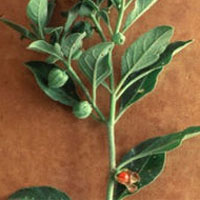Penn Herb Wellness Guide
AshwagandhaFind Products
 © Steven Foster
© Steven FosterParts Used & Where Grown
Ashwagandha, which belongs to the pepper family, is found in India and Africa. The roots of ashwagandha are used medicinally.
- Reliable and relatively consistent scientific data showing a substantial health benefit.
- Contradictory, insufficient, or preliminary studies suggesting a health benefit or minimal health benefit.
- For an herb, supported by traditional use but minimal or no scientific evidence. For a supplement,little scientific support.
Our proprietary “Star-Rating” system was developed to help you easily understand the amount of scientific support behind each supplement in relation to a specific health condition. While there is no way to predict whether a vitamin, mineral, or herb will successfully treat or prevent associated health conditions, our unique ratings tell you how well these supplements are understood by the medical community, and whether studies have found them to be effective for other people.
For over a decade, our team has combed through thousands of research articles published in reputable journals. To help you make educated decisions, and to better understand controversial or confusing supplements, our medical experts have digested the science into these three easy-to-follow ratings. We hope this provides you with a helpful resource to make informed decisions towards your health and well-being.
This supplement has been used in connection with the following health conditions:
| Used for | Amount | Why |
|---|---|---|
Osteoarthritis (Boswellia, Turmeric (Curcumin)) | 1,000 mg daily boswellia resin herbal extract or two capsules, three times per day of Aticulin-F (formula containing 100 mg boswellia, 450 mg ashwagandha, 50 mg turmeric, and 50 mg zinc) | A combination of boswellia, ashwagandha, turmeric, and zinc effectively treated pain and stiffness in one study, without the stomach irritation that is a common side effect of NSAIDs. |
Immune Function | 3 to 6 grams daily of the dried root as tea or in a capsule | Ashwagandha stimulates the immune system and is considered a tonic or adaptogen—an herb with multiple actions that counteract the effects of stress and generally promote wellness. |
Stress | Refer to label instructions | Ashwagandha may be helpful for reducing the effects of stress, including chronic psychological stress. |
Traditional Use (May Not Be Supported by Scientific Studies)
The health applications for ashwagandha in traditional Indian and Ayurvedic medicine are extensive. Of particular note is its use against tumors, inflammation (including arthritis), and a wide range of infectious diseases.1 The shoots and seeds are also used as food and to thicken milk in India. Traditional uses of ashwagandha among tribal peoples in Africa include fevers and inflammatory conditions.2 Ashwagandha is frequently a constituent of Ayurvedic formulas, including a relatively common one known as shilajit.
Copyright 2025 TraceGains, Inc. All rights reserved.
Learn more about TraceGains, the company.
The information presented by TraceGains is for informational purposes only. It is based on scientific studies (human, animal, or in vitro), clinical experience, or traditional usage as cited in each article. The results reported may not necessarily occur in all individuals. Self-treatment is not recommended for life-threatening conditions that require medical treatment under a doctor's care. For many of the conditions discussed, treatment with prescription or over the counter medication is also available. Consult your doctor, practitioner, and/or pharmacist for any health problem and before using any supplements or before making any changes in prescribed medications. Information expires December 2025.


